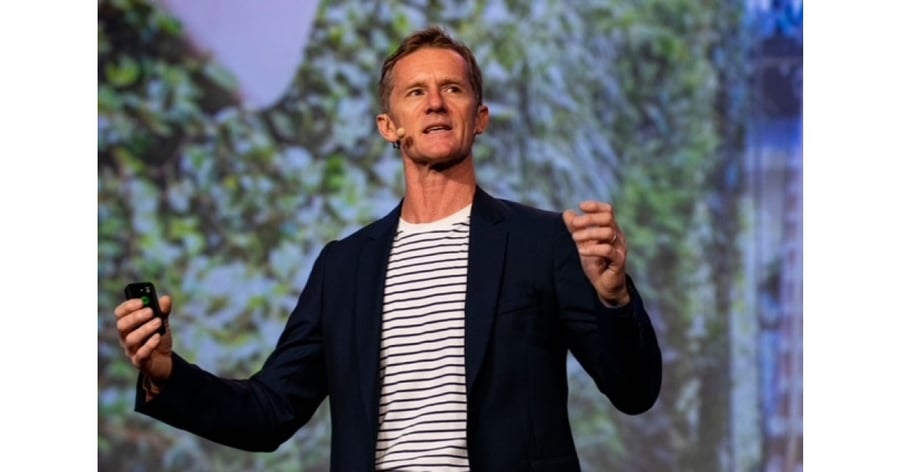Duncan Young on wellbeing: ‘it’s the little things that make a big difference’

Duncan Young left his traditional career path after 28 years to raise awareness for the value of prioritising health and wellbeing in the workplace. Now, Duncan is travelling the world as a wellbeing speaker and habit change leader, sharing insights on how our environment can be used to enhance our physical and mental health.
We’re excited to have Duncan joining us at the ArchiPro Commercial Expo this November. In the lead up to the event, we caught up with Duncan to learn more about his work and what he will be speaking about at his session.
Hi Duncan, can you tell us a little bit about yourself and what led you towards working as a wellbeing speaker and habit change leader specifically for the commercial sector?
My background is typical of many property professionals with a Bachelor of Building from UNSW. I followed a traditional career path through project and development management with international property group Lendlease, which lasted almost 28 years. However, our lives and careers are not linear, and they organically evolve in the direction of our passions and strengths. In my case, it would have been hard to forecast where I am now, but looking retrospectively, I can see all the small steps that helped me build and craft the position I am in today.
It started with an interest in environmental sustainability; building a passive solar home and taking a UN secondment to Sri Lanka for tsunami reconstruction led to a sustainability opportunity in the United Kingdom. Returning to Australia in 2013 I saw another trend on the horizon: the sustainability of human capital. From that point forward, I started researching wellbeing and what makes people thrive in life and work. Understanding that wellbeing is a skill that can be learnt, I have been helping people raise awareness about the power of health and wellbeing to enhance lives and embed the habit change required to support people making the change.
The most significant impact we see is when environments are created that nudge people to make healthier choices every day. Unfortunately, the physical space is not enough to promote wellbeing, but when supported by awareness sessions and habit change programs, the opportunity for wellbeing change is accelerated.
How do you think the way we work now impacts our wellbeing?
How we live and work is changing, and in recent years we have seen specific trends accelerate, especially due to Covid-19. At a high-level, employment is positive for our wellbeing, especially compared to someone who is unemployed and wanting to work. Good work can provide an opportunity to be part of something bigger than ourselves, the autonomy to achieve what we want to do each day, foster a sense of belonging with social connections, and allow us to use our strengths.
As the nature of work continues to evolve, organisations and individuals alike will need to join together to ensure that wellbeing continues to be a priority, and any changes to our work that have potential negatives can be mitigated in some way. A good example is a move to remote working. For many this could provide autonomy, allowing employees to avoid the daily commute and instead use this time for exercise, hobbies, or community engagement. The downside could be lack of observational learning, increased loneliness, increased screen time, or increased work hours. Still, most of these can be addressed if we acknowledge the challenges and are intentional about solving these negatives collectively. Already we are seeing these changes work for many people, and we need to focus on the ‘bright spots’ that are working, and disregard those actions or activities that are not.
What are some key things you think businesses need to embrace to ensure a healthier work environment for their employees?
Work impacts our lives not only by providing financial income but also by shaping our identity, creating social connections, and being a source of meaning and purpose. At its simplest level, the work environments we create should reduce ill-being and promote wellbeing, which is pretty obvious. How we do this is a little more complex, but most successful programs combine both physical and organisation programs, observing what has worked well and engaging the work community to align business goals with employee goals in a holistic strategy. It's often the little things that make a big difference.
How does your work intersect with the design and construction industry?
Our environment can change the way we think, feel and act. Physical environments can promote wellbeing, foster social connections and nudge people to make healthier choices everyday. Working with the design and construction industry ensures that the built environment supports or enhances wellbeing is the first step. Additionally programs can be developed to ensure that the physical spaces are promoted and utilised.
Can you give us a quick overview of what you will be speaking about at the ArchiPro Commercial Expo?
The session will focus firstly on why wellbeing helps us perform at our individual best with positive impacts both at business and community levels, and secondly, sharing insights on how small intentional steps made daily make a big difference over time.
What aspect of the ArchiPro Commercial Expo are you looking forward to most?
Conferences allow us to step away from our everyday lives and create space for us to reflect on the bigger elements that help us move forward. The opportunity to physically meet, hear and engage with global thinkers at ArchiPro will, I am sure, spark new ideas for the future.
Come along to the ArchiPro Commercial Expo to hear from Duncan, and other experts, on how we can design spaces to better prioritise wellbeing. Register here.




